An indefinite nationwide strike by Costa Rica’s public workers is now in its third week, as unions remain bitterly opposed to a proposed package of tax reforms and changes to public servants’ compensation that aims to rein in the country’s public debt. Union representatives have met with their government counterparts for marathon negotiating sessions in recent days but have failed to resolve the dispute. In an email interview with WPR, Layla Zaglul, a Costa Rican doctoral candidate at the University of Sussex, discusses the strike and its political and fiscal implications.
World Politics Review: What are the main reasons for the recent strike and the popular discontent with President Carlos Alvarado Quesada’s administration?
Layla Zaglul: The main reason for the discontent, and the reason behind the indefinite strike by public workers, is opposition to the draft Law on Strengthening Public Finance that is currently being discussed in the Legislative Assembly. The strike, which started on Sept. 10, is directed by the main public sector unions: the National Association of Public and Private Employees, the Association of Secondary School Teachers and the National Association of Educators, among others.

